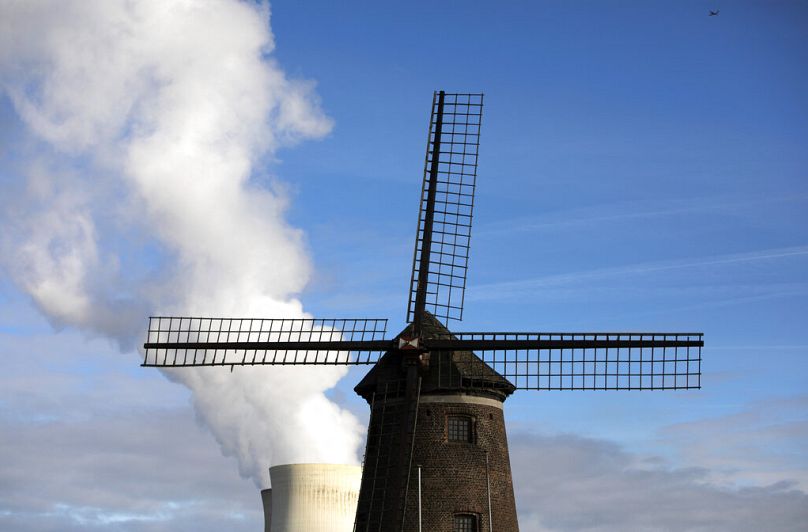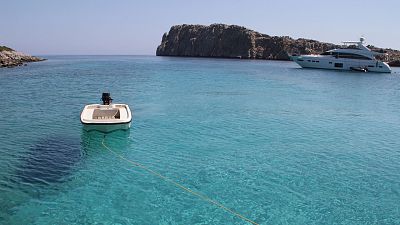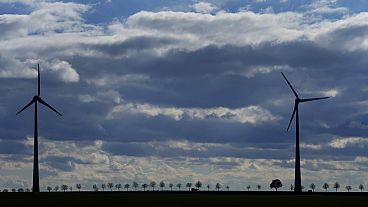We implore EU and member state leaders to prioritise the protection of citizens and environments suffering from chemical, pesticide, and fossil fuel pollution, and action to ensure that big polluters can no longer evade responsibility for the climate crisis, seven European activists write.
We are appalled that on Tuesday, the Belgian Presidency of the EU is organising, alongside the lobby group the European Chemical Industry Council (CEFIC) and its Belgian industry member Essenscia — a closed event for chemical and other intensive industrial energy users and high-level political leaders at BASF’s chemicals plant in Antwerp.
By overseeing and participating in this event Belgian Prime Minister Alexander De Croo, alongside other attendees such as European Commission President Ursula von der Leyen, have failed to recognise the culpability of the corporate interests attending in contributing to the climate, toxic pollution, and biodiversity crises which pose a tremendous risk to planetary boundaries and a death threat to communities around the world.
These crises are a result of decades of irresponsible corporate decision-making that has insisted on producing and using hazardous substances and burning fossil fuels for profit.
In the past five years, BASF, other chemical corporations and intensive energy users, and their lobby groups, have waged a huge lobby campaign in Brussels and across Europe to undermine and destroy ambitious regulations promised by the von der Leyen Commission.
The goals of the Chemicals Strategy for Sustainability and the Farm to Fork strategy to restrict hazardous chemicals in consumer and agricultural uses in the EU, as well as to prevent the export of banned substances, including chemicals and pesticides, have faded away.
Meanwhile, industry has also secured massive support for new fossil fuel infrastructure and false solutions to the climate crisis such as hydrogen, carbon capture, and offsets.
An insult to those confronting the toxic pollution crisis
The industry has a long history of crying wolf and exaggerating the consequences of progressive green policies.
And, in a big year for elections in Belgium and across the EU, too many politicians are falling for the rhetoric that there should be a “pause” in new environmental rules and that net zero is somehow as good as real zero.
Politicians have a responsibility to show genuine leadership rather than following the latest greed-driven, populist, scaremongering.
But rather than spearheading an approach to stand up to these lobbies and reverse these trends, instead, De Croo, von der Leyen and others are rewarding big polluting industries with privileged access to high-level decision-makers and the expectation of even more political and policy support.
This event is an insult to communities in Flanders, in Wallonia, and across the rest of the EU and beyond, who are currently confronting the reality of the industry-generated toxic pollution crisis in terms of their personal health and that of their local biodiversity, air, water, and soils.
Local residents close to the 3M plant in Zwijndrech, near Antwerp, have been advised to stop eating fruit, vegetables, and eggs produced locally due to the risk from PFAS "forever chemicals" pollution.
Big business in the driving seat
This event with its emphasis on industry’s “business case” and even a “European Industrial Deal” is entirely wrong-headed, and sits at odds with the Belgian Presidency’s promise of “decisive and holistic action” to tackle the climate, biodiversity, and pollution crises.
It puts big business in the driving seat to promote its agenda of avoiding legislation, demanding public subsidy, and pushing a corporate greenwashed, deeply-flawed "net zero" approach.
This event, and the political agenda it represents, should not be going ahead.
We and over 70 other organisations have written to urge De Croo and all other political leaders attending to stop providing such privileged access to industries that are known for their harmful products and practices, as well as for their lobbying against action for healthier communities, resilient ecosystems, and genuine carbon reduction.
We implore EU and member state political leaders to prioritise the protection of citizens and environments suffering from chemical, pesticide, and fossil fuel pollution, and to fight for an ambitious implementation of the Chemicals Strategy for Sustainability, the Farm to Fork strategy, and action to ensure that big polluters can no longer evade responsibility for the climate crisis.
Tycho Van Hauwaert is Policy Officer on Industry and Circular Economy at the Bond Beter Leefmilieu; Sylvie Meekers is Director General at Canopea; Katrin Van den Troost is an activist with Climaxi; Vicky Cann is Campaigner at the Corporate Europe Observatory; Tatiana Santos is Head of Chemicals Policy at the European Environmental Bureau; Hedwig Rooman is a member of Grondrecht; and Jonas Jaccard is Advocacy Officer at Humundi.
At Euronews, we believe all views matter. Contact us at view@euronews.com to send pitches or submissions and be part of the conversation.




